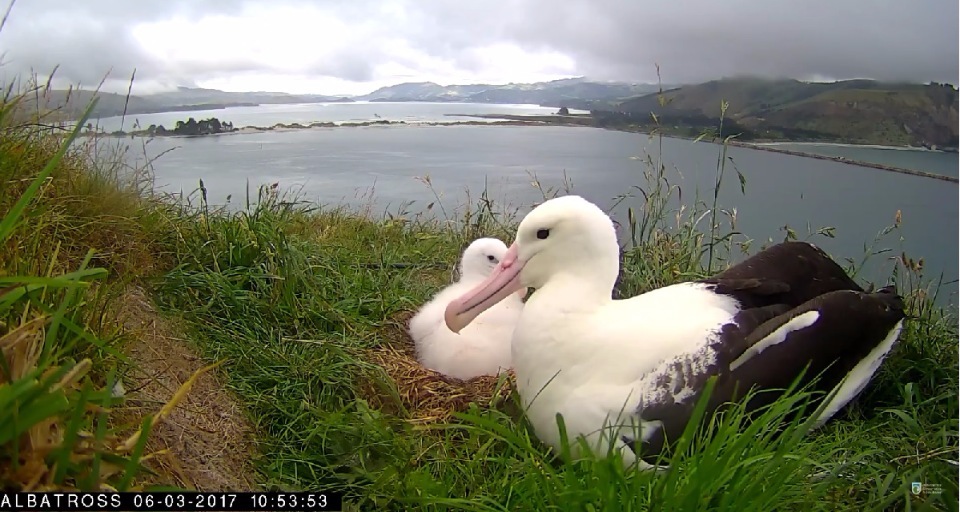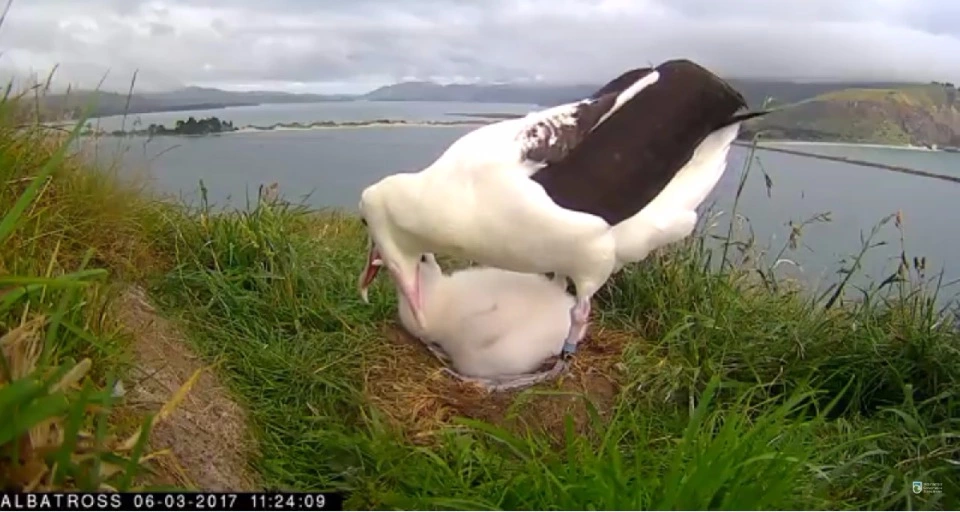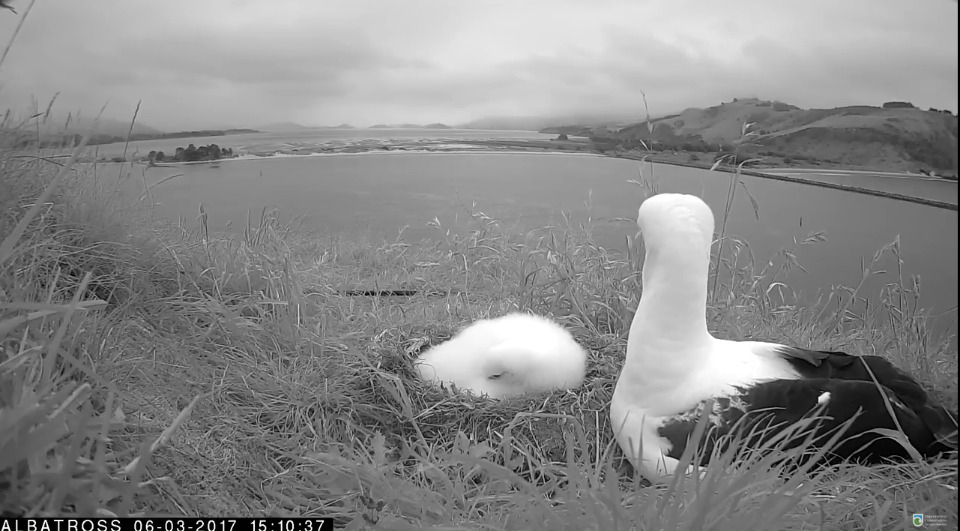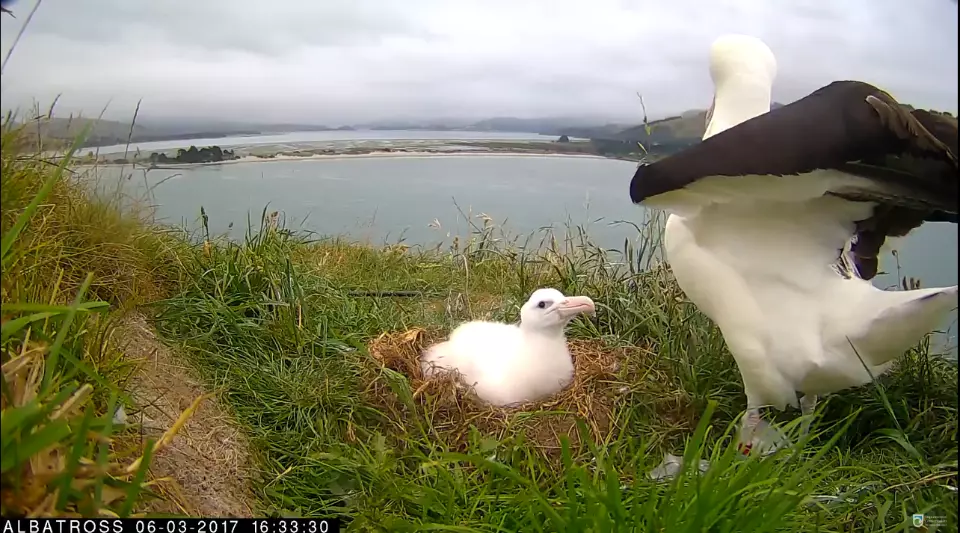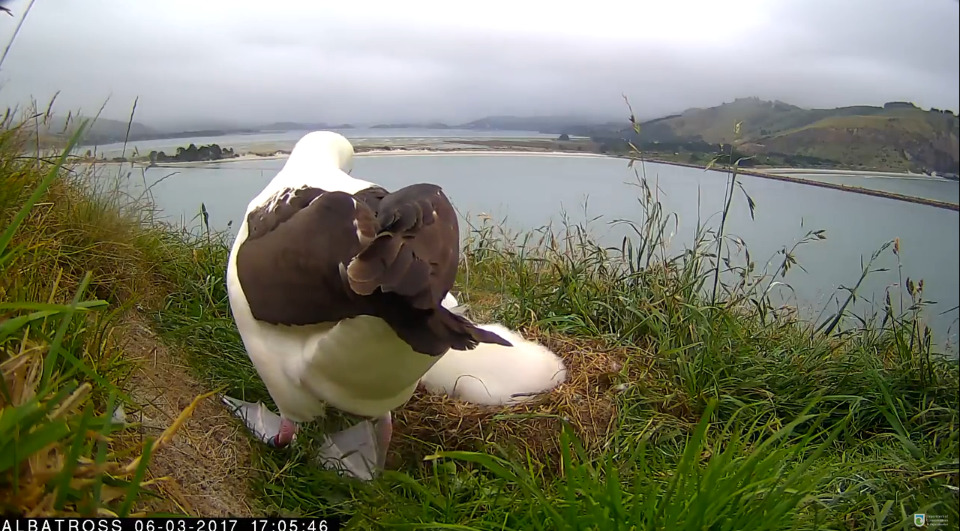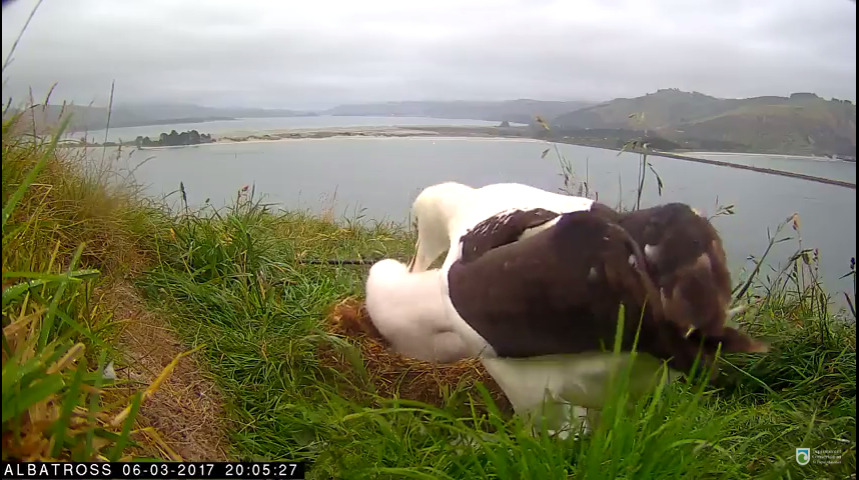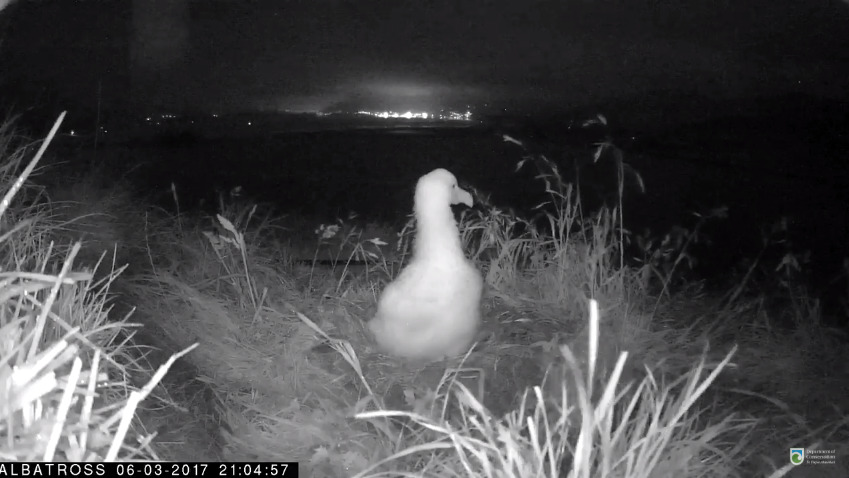To es saprotu, bet ja tētis aizlidoja, tad mamma ir kaut kur netālu, tikai neredzam kamerā un kaut kad parādīsies.Vērotāja wrote:
Kad viens atgriežas, otrs aizlido. To jau mēs vērojam visas ligzdošanas laikā.
Ziemeļu karaliskais albatross, Jaunzēlande, 2016/2017
Re: Ziemeļu karaliskais albatross, Jaunzēlande, 2017
Re: Ziemeļu karaliskais albatross, Jaunzēlande, 2017
13:45
Atlidojusi bērnam mamma
14:08
Mamma stāsta un bērns uzmanīgi klausās

14:16
Barošana
Atlidojusi bērnam mamma
14:08
Mamma stāsta un bērns uzmanīgi klausās

14:16
Barošana
Last edited by Sarmīte on 16 Mar 2022 08:29, edited 1 time in total.
- Lianaliesma
- Posts: 48277
- Joined: 02 Jun 2013 16:41
Re: Ziemeļu karaliskais albatross, Jaunzēlande, 2017
Labdien!
Raganiet, paldies par komentāriem, izskatās, ka abi vecāki tagad zina, ka mazo atstāj vienu un tāpēc vairs nepaliek prom ilgi ne viens, ne otrs.
Raganiet, paldies par komentāriem, izskatās, ka abi vecāki tagad zina, ka mazo atstāj vienu un tāpēc vairs nepaliek prom ilgi ne viens, ne otrs.
Kad acis, ausis un sirds atveras, dvēsele izpeldas skaistumā. Z.Mauriņa
Saskaņu forumā veicina savlaicīga un publiska vienošanās par pieņemamāko problēmas risinājumu.
Mēs mācāmies bez nosacījuma iemīlēt ne tikai putnus, bet arī cilvēkus.
Saskaņu forumā veicina savlaicīga un publiska vienošanās par pieņemamāko problēmas risinājumu.
Mēs mācāmies bez nosacījuma iemīlēt ne tikai putnus, bet arī cilvēkus.
Re: Ziemeļu karaliskais albatross, Jaunzēlande, 2017
Labdien!lianaliesma wrote:Labdien!
Raganiet, paldies par komentāriem, izskatās, ka abi vecāki tagad zina, ka mazo atstāj vienu un tāpēc vairs nepaliek prom ilgi ne viens, ne otrs.
Laikam jau abi tagad aizlidos un atlidos,tikai tētis liekas tāds apzinīgāks.Arī šoreiz aizlidoja,kad zināja par mammītes ierašanos.
Re: Ziemeļu karaliskais albatross, Jaunzēlande, 2017
The Royal Albatross Centre
DoC COLONY UPDATE from Head Ranger Lyndon Perriman.
21 of 23 chicks have spent time alone (this is the post guard stage), A walk around this morning, I was meet by a number of nervous chicks. This makes weighing them difficult as one wrong move on approach or handling and the chick will vomit (looks like one has done this over the last few days, probably in response to adolescent "bad"-behaviour (where some adolescents are curious about the white fluffy thing in the grass and come over to investigate the chick). Unfortunately, some times these curious adolescent birds can be a little rough and that can lead to chicks' vomiting as their last defence against an intruder. If this happens, then it almost always leads to that chick being a nervous wreck for weeks/months afterwards.
When approaching chicks for their weekly weighing, we try to do it when an adult is present (a calming influence on the chick), however as we can see with the webcam chick currently there are long periods between visitations by the adults (and incidentally this webcam chick has had a rough time with adolescent birds over the last few days) so care is needed when approaching chicks of this age that are alone.
Some nervous chicks may not be weighed for weeks, but at this early stage of the post guard stage, as long as we see both parents regularly we can be fairly sure the chick will be at a healthy weight. However, as these chicks age it becomes vital to get them used to being handled and weighed; last season for example, there were four chicks that required long term supplementary feeding (due to missing parents or other causes) and most probably would not have survived without the additional food we provided (thanks New Zealand King Salmon!!)
Last week we had the cute little visitor pictured. Spirit is a trained mustelid dog, trained to detect the presence of stoats, ferrets and weasels . He was worked over non-albatross areas (To avoid making nervous chicks more nervous) and covered ground behind the albatross colony where he ignored scent of penguins, shearwaters and rabbits. Stopping only at traps where we had used stoat bedding as a lure for trapping other mustelids (Stoat bedding comes from a university where they are studying various aspects of stoat ecology. Using the bedding with stoaty smells seems to work as a lure to capturing these introduced predators as does other traps we have baited with meat or hen's eggs).
The good news is the dog didn't detect any other signs of stoats, the bad news is, stoats have large home ranges of several kilometres to forage, so while no scent was present on the day it doesn't mean the area is stoat free. It is this period now that chicks are most vulnerable.
(Lūgums iztulkot,ar tulkotāju lasot likās interesanti)
DoC COLONY UPDATE from Head Ranger Lyndon Perriman.
21 of 23 chicks have spent time alone (this is the post guard stage), A walk around this morning, I was meet by a number of nervous chicks. This makes weighing them difficult as one wrong move on approach or handling and the chick will vomit (looks like one has done this over the last few days, probably in response to adolescent "bad"-behaviour (where some adolescents are curious about the white fluffy thing in the grass and come over to investigate the chick). Unfortunately, some times these curious adolescent birds can be a little rough and that can lead to chicks' vomiting as their last defence against an intruder. If this happens, then it almost always leads to that chick being a nervous wreck for weeks/months afterwards.
When approaching chicks for their weekly weighing, we try to do it when an adult is present (a calming influence on the chick), however as we can see with the webcam chick currently there are long periods between visitations by the adults (and incidentally this webcam chick has had a rough time with adolescent birds over the last few days) so care is needed when approaching chicks of this age that are alone.
Some nervous chicks may not be weighed for weeks, but at this early stage of the post guard stage, as long as we see both parents regularly we can be fairly sure the chick will be at a healthy weight. However, as these chicks age it becomes vital to get them used to being handled and weighed; last season for example, there were four chicks that required long term supplementary feeding (due to missing parents or other causes) and most probably would not have survived without the additional food we provided (thanks New Zealand King Salmon!!)
Last week we had the cute little visitor pictured. Spirit is a trained mustelid dog, trained to detect the presence of stoats, ferrets and weasels . He was worked over non-albatross areas (To avoid making nervous chicks more nervous) and covered ground behind the albatross colony where he ignored scent of penguins, shearwaters and rabbits. Stopping only at traps where we had used stoat bedding as a lure for trapping other mustelids (Stoat bedding comes from a university where they are studying various aspects of stoat ecology. Using the bedding with stoaty smells seems to work as a lure to capturing these introduced predators as does other traps we have baited with meat or hen's eggs).
The good news is the dog didn't detect any other signs of stoats, the bad news is, stoats have large home ranges of several kilometres to forage, so while no scent was present on the day it doesn't mean the area is stoat free. It is this period now that chicks are most vulnerable.
(Lūgums iztulkot,ar tulkotāju lasot likās interesanti)
- Lianaliesma
- Posts: 48277
- Joined: 02 Jun 2013 16:41
Re: Ziemeļu karaliskais albatross, Jaunzēlande, 2017
21 no 23 cāļiem ir pavadījuši laiku vienatnē, rīta apgaitā satikos ar vairākiem satrauktiem mazuļiem. Tas padara grūtāku svēršanu, jo viena nepareiza kustība tuvojoties vai sverot var izsaukt cālim vemšanu (izskatās, ka viens mazulis ir vēmis pēdējo dažu dienu laikā, iespējams, atbildot uz sveša pusaudža garāmgājēja "slikto" uzvedību, izrādot interesi par balto pūkaini). Diemžēl reizēm šie ziņkārīgie pusaudži var būt nedaudz asi un tas var novest pie vemšanas kā mazuļa pēdējās aizstāvības pret svešinieku. Ja tā notiek, tad tas gandrīz vienmēr noved pie tā, ka mazulis kļūst satraukts nedēļām / mēnešiem ilgi pēc tam.Raganiete wrote:The Royal Albatross Centre
DoC COLONY UPDATE from Head Ranger Lyndon Perriman.
21 of 23 chicks have spent time alone (this is the post guard stage), A walk around this morning, I was meet by a number of nervous chicks. This makes weighing them difficult as one wrong move on approach or handling and the chick will vomit (looks like one has done this over the last few days, probably in response to adolescent "bad"-behaviour (where some adolescents are curious about the white fluffy thing in the grass and come over to investigate the chick). Unfortunately, some times these curious adolescent birds can be a little rough and that can lead to chicks' vomiting as their last defence against an intruder. If this happens, then it almost always leads to that chick being a nervous wreck for weeks/months afterwards.
When approaching chicks for their weekly weighing, we try to do it when an adult is present (a calming influence on the chick), however as we can see with the webcam chick currently there are long periods between visitations by the adults (and incidentally this webcam chick has had a rough time with adolescent birds over the last few days) so care is needed when approaching chicks of this age that are alone.
Some nervous chicks may not be weighed for weeks, but at this early stage of the post guard stage, as long as we see both parents regularly we can be fairly sure the chick will be at a healthy weight. However, as these chicks age it becomes vital to get them used to being handled and weighed; last season for example, there were four chicks that required long term supplementary feeding (due to missing parents or other causes) and most probably would not have survived without the additional food we provided (thanks New Zealand King Salmon!!)
Last week we had the cute little visitor pictured. Spirit is a trained mustelid dog, trained to detect the presence of stoats, ferrets and weasels . He was worked over non-albatross areas (To avoid making nervous chicks more nervous) and covered ground behind the albatross colony where he ignored scent of penguins, shearwaters and rabbits. Stopping only at traps where we had used stoat bedding as a lure for trapping other mustelids (Stoat bedding comes from a university where they are studying various aspects of stoat ecology. Using the bedding with stoaty smells seems to work as a lure to capturing these introduced predators as does other traps we have baited with meat or hen's eggs).
The good news is the dog didn't detect any other signs of stoats, the bad news is, stoats have large home ranges of several kilometres to forage, so while no scent was present on the day it doesn't mean the area is stoat free. It is this period now that chicks are most vulnerable.
(Lūgums iztulkot,ar tulkotāju lasot likās interesanti)
Tuvojoties mazuļiem iknedēļas svēršanās, mēs cenšamies to darīt, kad pieaugušais ir klāt (nomierinoša ietekme uz cāli). Taču, kā mēs varam redzēt tiešraides ligzdā, šobrīd pieaugušo vizītes ligzdā ir retas (starp citu, tiešraides mazulim bijusi neapskaužama pieredze ar garāmgājējiem pēdējo dažu dienu laikā), bet aprūpe ir nepieciešama arī tad, ja cāļi ir vieni.
Dažus nervozākos mazuļus nevar svērt pat vairākas nedēļas, taču šajā agrīnajā posmā, kamēr mēs redzam abus vecākus regulāri, mēs varam būt diezgan pārliecināti, ka tiem ir veselīgs svars. Tomēr mazuļiem augot, svarīgi, lai mazuļi pierastu pie tā, ka tos sver un pārbauda. piem., pagājušajā sezonā 4-iem mazuļiem bija nepieciešama papildus barošana (sakarā ar vecāku ilgo prombūtni vai citu iemeslu dēļ) un, visticamāk, tie nebūtu izdzīvojuši bez papildu barošanas.
Pagājušajā nedēļā mums bija jauks mazs apmeklētājs. Spirit ir apmācīts suns, lai noteiktu sermuļu, sesku un zebiekstu klātbūtni. Viņš strādāja teritorijās bez albatrosiem (lai nesatrauktu mazuļus) aiz kolonijas teritorijas, kur viņš nevarēja tikt maldināts ar pingvīnu, vētrasputnu un trušu smakām. Viņš apskatīja tikai slazdus, ko izmantojam sermuļu un citu plēsēju ķeršanai. Labā ziņa ir, ka suns neatklāja nekādas plēsēju pazīmes, slikta ziņa ir tā, ka plēsēju barošanās teritorijas ir vairāku kilometru diapazonā, tas nozīmē, ka lai arī dienā nav jūtamas plēsēju pēdas, tas nenozīmē, ka to nav. Pašlaik ir tas periods, kad mazuļi ir visneaizsargātākie.
Kad acis, ausis un sirds atveras, dvēsele izpeldas skaistumā. Z.Mauriņa
Saskaņu forumā veicina savlaicīga un publiska vienošanās par pieņemamāko problēmas risinājumu.
Mēs mācāmies bez nosacījuma iemīlēt ne tikai putnus, bet arī cilvēkus.
Saskaņu forumā veicina savlaicīga un publiska vienošanās par pieņemamāko problēmas risinājumu.
Mēs mācāmies bez nosacījuma iemīlēt ne tikai putnus, bet arī cilvēkus.
Re: Ziemeļu karaliskais albatross, Jaunzēlande, 2017
Liels,liels paldies,lianaliesma!lianaliesma wrote:The Royal Albatross Centre
Nemāku ielikt smaidiņus -puķītes,bet saliktu daudz,daudz.
Pareizi tomēr biju novērojusi,ka mazulim ir bailes no tiem staigātājiem.
- Lianaliesma
- Posts: 48277
- Joined: 02 Jun 2013 16:41
Re: Ziemeļu karaliskais albatross, Jaunzēlande, 2017
Kad acis, ausis un sirds atveras, dvēsele izpeldas skaistumā. Z.Mauriņa
Saskaņu forumā veicina savlaicīga un publiska vienošanās par pieņemamāko problēmas risinājumu.
Mēs mācāmies bez nosacījuma iemīlēt ne tikai putnus, bet arī cilvēkus.
Saskaņu forumā veicina savlaicīga un publiska vienošanās par pieņemamāko problēmas risinājumu.
Mēs mācāmies bez nosacījuma iemīlēt ne tikai putnus, bet arī cilvēkus.


